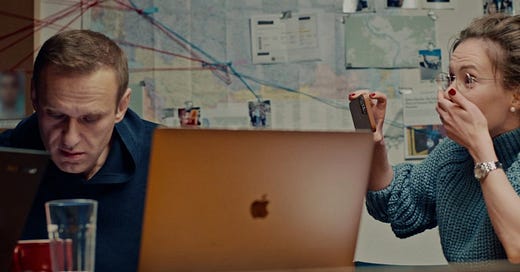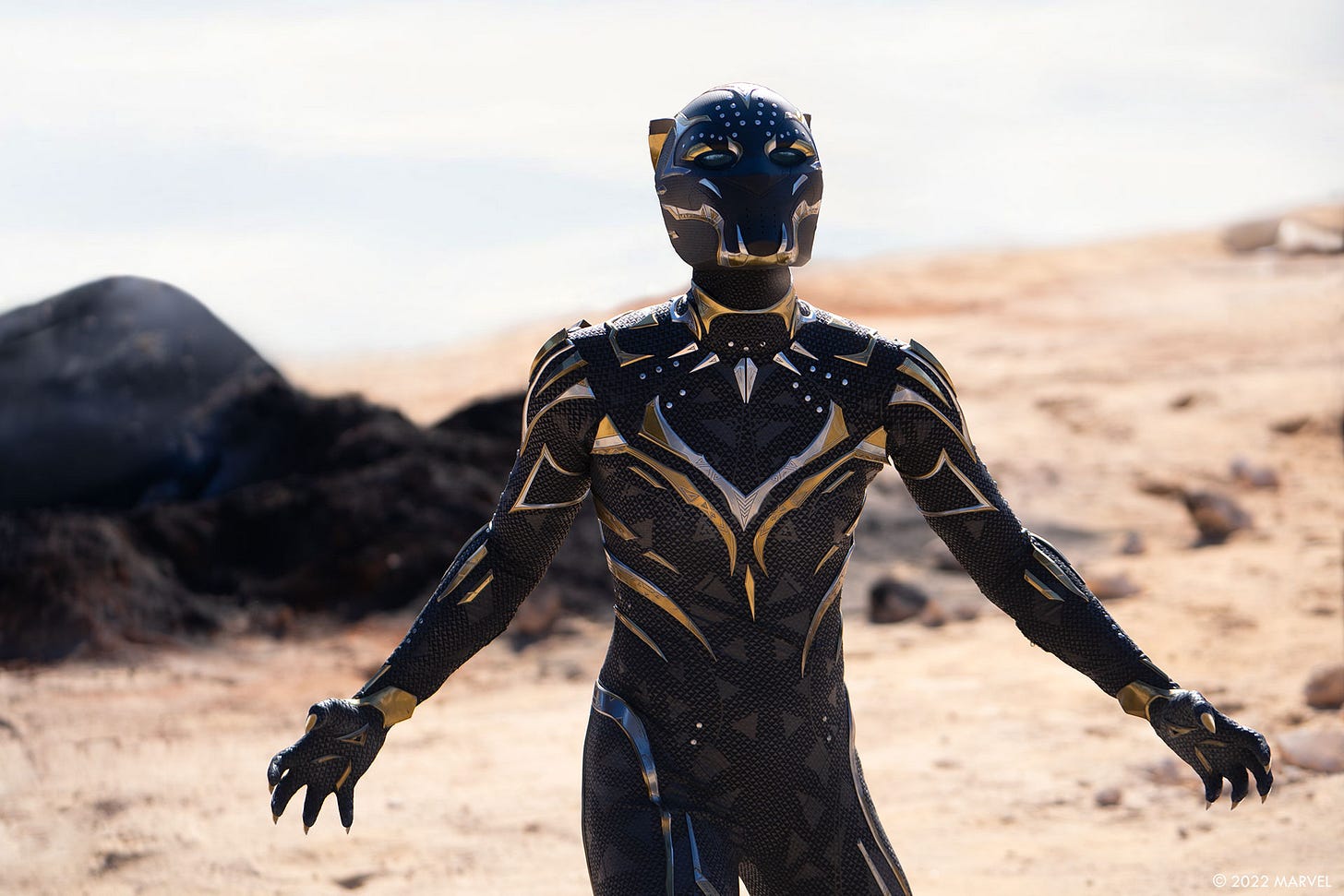Navalny, Please Baby Please, and…Wakanda Forever? Weekly Reel #48
What does a political documentary about a Russian, a kitsch pyscho-sexual violent drama, and a fictional African kingdom have in common? Absolutely nothing!
News of the Week: Apologies for the posting lag, I moved to Berlin and needed an adjustment period. My film viewings also changed; less on current theatrical releases (German theatrical releases are often much different for non-studio films) and more on foreign (mostly European and Asian) films.
Watch Now
Navalny (2022, Daniel Roher, USA) was the surprise Oscar winner for Best Documentary, beating out festival and critical darlings All the Beauty and the Bloodshed and Fire of Love. Equal parts affective filmmaking and wanting to stick it to Putin, Navalny was elevated to its position of recognition by a culture of international crimes, neo-Cold War paranoia, and IoT sleuthing. But these zeitgeisty concerns aren’t what makes the film an effective documentary, which will hopefully live past its five second of fame.
The film details the events around Russian opposition leader Alexei Navalny’s poisoning in 2020 and subsequent investigation by Bellingcat and an anti-corruption organization. Unknowingly worked on at the same time by Navalny & Co., then recovering from his attempted assassination, was a documentary called Putin's Palace, released in 2021, revealing Putin’s secret palace purchased through oligarchical kickbacks. A documentary film crew led by Canadian director Daniel Roher followed Navalny from his recovery to his arrest in 2021 when he returned to Russia.
The story goes that Alexei Navalny was gaining too much power as an opposition figure to Putin for his ability to remain light on policy and heavy on anti-corruption, which Russians on all sides could agree with. The charismatic Navalny, who became famous making videos exposing this corruption, was in Tomsk and poisoned at the airport. On his way back to Moscow, they emergency land in Omsk where he’s sealed away at a hospital for two days (to let the poison exit the body). The doctors think enough time has passed and released Navalny, who’s immediately sent to Charité in Berlin, where, surprise, they find poison in his system. And not just any poison, but Novichok nerve agent, which is Putin’s (un)official assassination go to.
While recovering in Germany with his family, Bellingcat journalist Christo Grozev tracked down the assassins and shared it with them. The montage of how he finds them through flight logs and phone records is one of the three heightened moments of the film that makes it feel like a page-turning thriller. The second moment occurs soon after, when Navalny prank calls the assassins, not expecting to get anywhere. To his, and everyone’s, surprise, one of the stereotypical “Russian bad guy buffoons” provided Navalny with all the confirmation needed to confirm Grozev’s research, ultimately linking Putin and assassins to the poisoning. It’s one of the incredible once-in-a-lifetime documentary moments, like in Virunga when an armed rebellion breaks out while a film crew is documenting a national park or when Robert Durst confesses to murder on a hot mic.
The third and prolonged moment is the climax, where Navalny returns to Russia, knowing he’ll be arrested at the very least. He gets on a commercial flight with every person on the plane recording him and his wife, which is cross-cut with footage from the airport where Navalny’s supporters are arrested and beaten by the police, then safely lands in Moscow and is arrested at border control with his wife and documentary film crew right by his side. The result is a martyr sacrificed to the Russian state and a film crew with footage financed by American companies, notably HBO Max and CNN Films.
The invasion of Ukraine further complicated Navalny’s release, which premiered at Sundance a month before. For that month, with troops amassing at the border, viewing the film must have felt urgent and desperate. Afterwards, it reads as “I told you so” in hindsight. While the goal of occupying the Donbas may have been larger than Navalny’s political threat for Putin, it created an atmosphere in Russia that made protesting against Navalny’s assassination attempt and sheer fact of existence impossible. Watching the political events and rallies of Navalny pre-poisoning is like watching a more naïve era, one where resisting the government, while still dangerous, was at least possible.
It's rare for this kind of political documentary to exist today: one that by pure chance was filmed at the best possible moment. The feeling in the air reeked of inevitability but could’ve easily produced nil. But the real strength of the doc isn’t its political motivations or its flash in the pan release; it simply tells a compelling story that at times intrigues and compels the narrative forward with a kind of arc that could only be filmed in real time and not planned beforehand. That’s the strength a documentary film has over everything else. It surprises, it delights, and it’s real.
Navalny is streaming on HBO Max.
Save for Later
Please Baby Please (2022, Amanda Kramer, USA) provides a thesis on, ‘what if a fifties married couple went through a Kubrickian Star Gate of gender morphing?’ Result: blue/red technicolor, a checklist of lgbtq+ characters role-playing high period kitsch, instability to the point of rebirth (though no star child). Existing as a story ostensibly written after complicated readings between Judith Butler and Camille Paglia, Amanda Kramer and co-writer Noel David Taylor played cinematic dress-up on an artificial soundstage that audiences at a 1956 Tennessee Williams play could recognize.
Andrea Riseborough (Suze) and Harry Melling (Arthur) play “man and wife.” A gang known as the Young Gents beat another couple to death in front of their apartment building, while Suze and Arthur watch in transfixed horror. Arthur drops his father’s trombone, which breaks into several pieces, marking the first point at which metaphor is the make-up of every character move and costume design. The gang intimidates the married deer in headlights, which results in a permanent shift in their conception of violence/sexuality. From here on, Suze articulates her persona through an inability to place her body in a rigid, upright structure while Harry looks struck by an Immobulus spell.
The gang confronts Arthur and Suze, who get their apartment number and threaten a future break-in. The homicidal violence uproots the couple’s conception of heterosexuality itself and argues that the two (violence and heterosexuality) are fellow travelers. Later in their apartment hosting several of their friends, Suze recounts the horror while acting out a slowly improvised Cirque du Soleil routine on the ground while Harry watches something a thousand yards away. For the rest of the film, Harry, who’s piqued by the Brando of the gang (Karl Glusman), and Suze, challenging the concept of a housewife with a superb Demi Moore and others, encounter different set-pieces of sexual intrigue and gender play that stretches definitions in every direction.
The film sometimes feels strained with non-sequiturs when Suze and Harry are exploring their fantasies apart from one another. Dreamy flashes and edits between the two doesn’t work as well in a film whose modus operandi is such. Riseborough goes full Oscar-nominee Riseborough, performing a masterclass in facial expressions that appear to be anchoring the rest of her bodily movements. Melling provides his finest Shakespearean monologues, acting as a definitive roar of masculine energy breaking through its musky confines in one of the more interesting careers of any Harry Potter cast member.
Please Baby Please is an excellent take on what can still be done depicting the endlessly pastiched fifties America. It never goes too far in the direction of queering straight representations in and of itself. What Nicholas Ray did with character emotions is what Kramer is doing with visual motifs. Fantasy versus Reality regarding sexuality is often a violent confrontation that is difficult to parse out. It’s often a feeling that can only be expressed through physical antagonisms and boundary-drawing. One second you’re dreaming about the man in the biker hat and before you know it, someone is stabbed in the neck.
Please Baby Please is streaming on Mubi.
Pass
Black Panther: Wakanda Forever (2022, Ryan Coogler, USA) is the sequel to Black Panther, a film whose novelty and main character didn’t re-appear. Chadwick Boseman’s unfortunate death impeded this film not only because the script had to be hastily rewritten, but also because his charisma and screen presence was the most compelling aspect of the first installment. That combined with Disney’s relentless marketing campaign at the height of the Marvel earnings era (2018-2019) made Black Panther $1.3 billion, $500 million more than Wakanda Forever. (I don’t want to hear the Covid excuse; Top Gun: Maverick made nearly $1.5 billion and Avatar: The Way of Water made $2.3 billion.)
Black Panther: Wakanda Forever feels like it was rushed, which it was, and that Disney/Marvel paid bottom-dollar for its graphics, which they did. It feels cheap and the lighting must have been done by the local High School film students. The plot basically revolves around whether a demi-god is hydrated or de-hydrated. The younger sister becomes the new black panther, shocking. A bright young MIT student is illegally kidnapped, extradited, and then develops Stockholm Syndrome. What else? They take some time to develop a post-marital relationship between Martin Freeman and Julia Louis-Dreyfus, who provided the obligatory Marvel comic relief.
The worst aspect is Disney holding Ryan Coogler hostage for sequels, whose career is currently at a one for me, three for you deal. He’s a young and undeniably brilliant director that deserves to make an original, non-branded product. But that doesn’t fit well into the Disney ouroboros ethos. Congrats to Ruth Carter for winning her second Oscar in Costume Design.
Thank you once again for checking out my Substack. Hit the like button and use the share button to share this across social media. And don’t forget to subscribe if you haven’t already done so.






